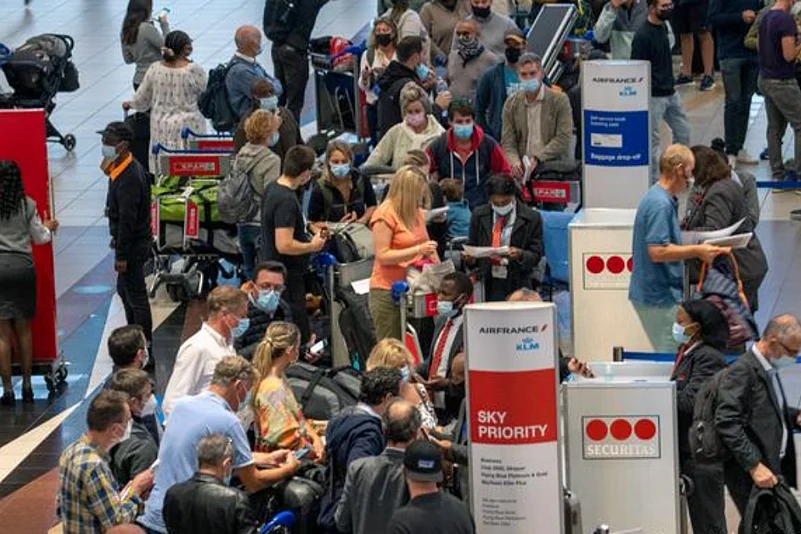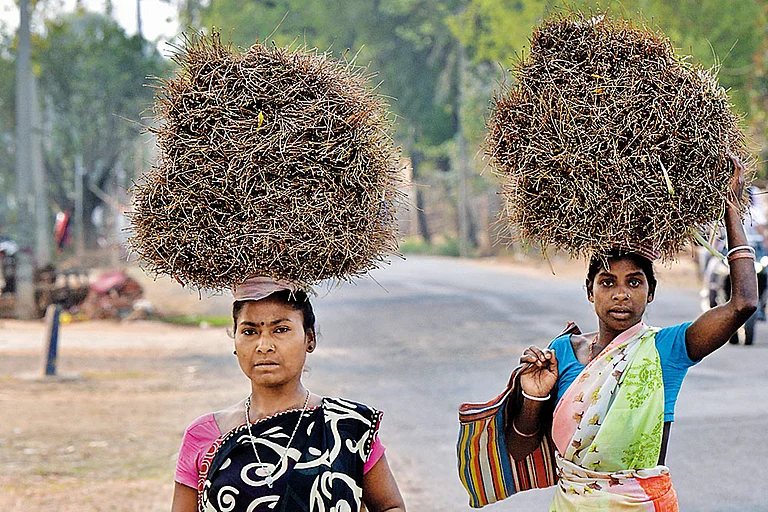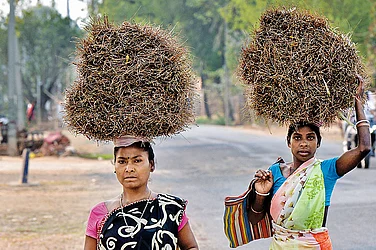Nations around the world have begun imposing travel bans on South Africa, along with several other neighboring countries, following the discovery of a new Covid-19 variant called omicron in southern Africa.
South African Health Minister Joe Phaahla told a news conference: "We believe that some of the reactions have been unjustified."
Phaahla said that for some countries the decision was about "finding scapegoats to deal with what is a worldwide problem."
The UK was the first to take action, and instituted a flight ban from countries in southern Africa, just hours after South African health authorities had given their briefing on the variant's discovery.
The World Health Organization (WHO) has cautioned against introducing travel curbs at this point, saying it could still take a number of weeks to determine the nature of the new variant.
Phaahla said the travel bans were "a wrong approach — it's misdirected and goes against the norms and advice by the WHO."
The health minister pointed out that some countries had infection rates of 50,000 new cases per day, while on Friday South Africa had reported 3,000 daily infections, which was up from the 300 reported two weeks previously.
Tulio de Oliveira, the virologist who announced the discovery, also questioned the wisdom behind the flight bans. "Scientifically it does not make much sense. A lot of time people take decisions based on emotions not rationality," he said.
Europe
The new omicron variant has "very likely" already arrived in Germany a minister in the state of Hesse said on Saturday after someone who had been in South Africa appeared to be infected with variant-typical mutations after arriving.
The chairman of the World Medical Association (WMA) thinks Germany could see a Covid-19 incidence rate of between 700 and 800 per 100,000 people within the next 10 days.
In an interview with the newspapers of the Funke media group of newspapers, WMA chief Frank Ulrich Montgomery called for new contact restrictions and for Christmas markets to be closed nationwide.
Germany's overall seven-day incidence rate stands at 444 cases per population of 100,000 as of Saturday, according to data from the Robert Koch Institute for disease control. The daily number of cases has been hitting new highs every day for almost three weeks.
Health Minister Jens Spahn also announced on Saturday that 10% of the German population has now received a booster vaccine.
Authorities in the Czech Republic are also investigating a possible omicron case after they found a "positive specimen" of the new variant in an individual who had recently been in Namibia.
Health authorities in the Netherlands have been testing passengers who arrived on two flights from South Africa on Friday to check for the newly discovered omicron variant.
Of the around 600 passengers, 61 tested positive for Covid-19, according to health authorities. Those infected would be isolated in nearby hotels, the health ministry said.
Authorities are racing to determine if any of the infections were of the omicron variant.
The European Centre for Disease Prevention and Control (ECDC) has said there is a "high to very high" risk that the new coronavirus variant will spread in Europe.
According to an ECDC risk assessment report, the "overall level of risk for the EU/EEA associated with SARS-CoV-2 variant omicron is assessed as high to very high."
The variant had already been detected in Belgium, as well as Israel, Botswana and Hong Kong by Friday.
British scientist and head of the Oxford Vaccine Group that developed the vaccine produced by AstraZeneca, Andrew Pollard, is cuatiously optimistic about the new omicron variant telling a BBC radio program that it is "extremely unlikely that a reboot of a pandemic in a vaccinated population like we saw last year is going to happen."
Next week's World Trade Organization (WTO) ministerial conference in Geneva has been postponed due to the new variant.
The decision was made four days before the summit was due to begin and hours after the WHO declared omicron a variant of concern.
New director-general Ngozi Okonjo-Iweala was also hoping to make progress toward a deal on lifting COVID vaccine patents, proving the WTO had a relevant role to play in combating the pandemic.
Americas
United States pharmaceutical company Moderna said on Friday that it would develop a booster shot against the new omicron variant.
CEO Stephane Bancel said they had been working for "several days" on possible strategies against the new variant, one of which is the booster shot.
Meanwhile, US authorities have also moved to ban travelers from eight southern African states beginning on Monday.
President Joe Biden called it a "precautionary measure" and added that the "pandemic will not end until we have global vaccination."
Asia
India has restarted exports of Covid-19 shots to the global vaccine-sharing network COVAX for the first time since April.
Serum Institute of India (SII), the world's biggest vaccine maker, has a deal to provide 550 million doses to the program, which gets vaccines to low-income countries, but has so far only delivered around 30 million.
The SII stopped exporting eight months ago as cases surged in India, but has since reached its target of producing 1 billion AstraZeneca shots ahead of time.
Indian Prime Minister Narendra Modi also said on Saturday that the recent plan to ease entry restrictions for passengers from countries "at risk" of Covid-19 outbreaks should be reviewed.
The country decided on Friday to allow passenger flights from those countries along with tight border screening. But the emergence of the omicron variant of concern has "highlighted the need for monitoring all international arrivals," Modi said.
Thailand has also announced a travel ban for people entering from eight African countries deemed as high risk due to the omicron variant, including South Africa, Botswana and Mozambique. The ban will come into effect from December.
Several Chinese cities have taken measures to curb rises in local cases. The major hub of Shanghai has limited tourism activities and sealed off certain residential compounds with hgher infections.
The city of Xuzhou has restricted public transport as well as closing several highway entrances while the capital Beijing has called off its annual marathon.
Oceania
Australia has also banned flights from nine southern African countries, to prevent the entry of the new omicron variant.
Non-Australians who visited South Africa, Zimbabwe and several other nations in the past fortnight will also be barred from Australia, Health Minister Greg Hunt said. Citizens and residents traveling from the listed countries will have to quarantine for 14 days.


























